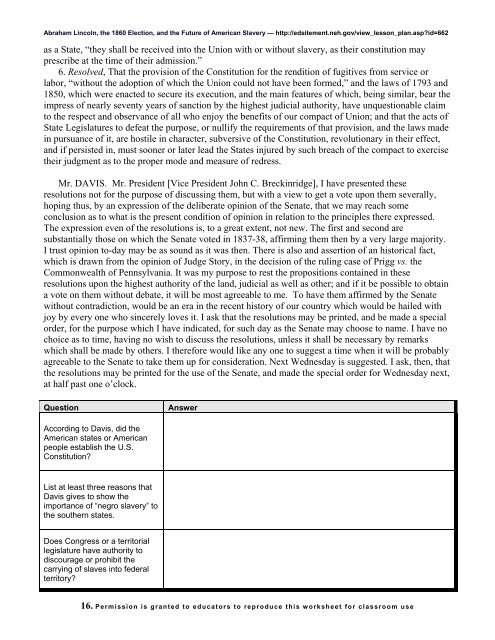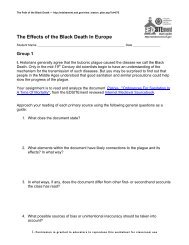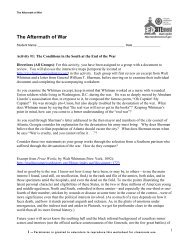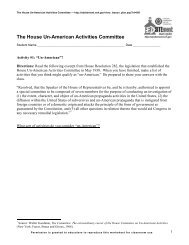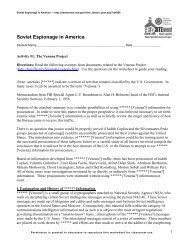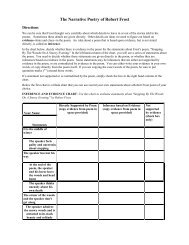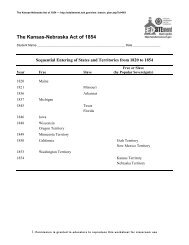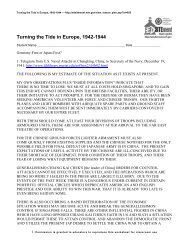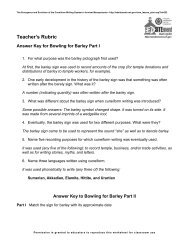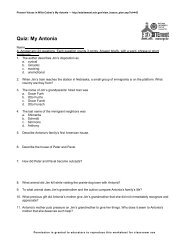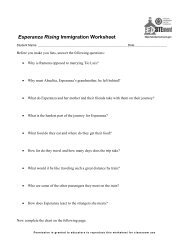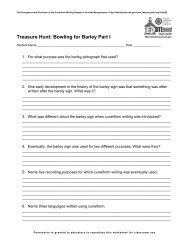Abraham Lincoln, the 1860 Election - EDSITEment
Abraham Lincoln, the 1860 Election - EDSITEment
Abraham Lincoln, the 1860 Election - EDSITEment
Create successful ePaper yourself
Turn your PDF publications into a flip-book with our unique Google optimized e-Paper software.
<strong>Abraham</strong> <strong>Lincoln</strong>, <strong>the</strong> <strong>1860</strong> <strong>Election</strong>, and <strong>the</strong> Future of American Slavery — http://edsitement.neh.gov/view_lesson_plan.asp?id=662<br />
as a State, “<strong>the</strong>y shall be received into <strong>the</strong> Union with or without slavery, as <strong>the</strong>ir constitution may<br />
prescribe at <strong>the</strong> time of <strong>the</strong>ir admission.”<br />
6. Resolved, That <strong>the</strong> provision of <strong>the</strong> Constitution for <strong>the</strong> rendition of fugitives from service or<br />
labor, “without <strong>the</strong> adoption of which <strong>the</strong> Union could not have been formed,” and <strong>the</strong> laws of 1793 and<br />
1850, which were enacted to secure its execution, and <strong>the</strong> main features of which, being similar, bear <strong>the</strong><br />
impress of nearly seventy years of sanction by <strong>the</strong> highest judicial authority, have unquestionable claim<br />
to <strong>the</strong> respect and observance of all who enjoy <strong>the</strong> benefits of our compact of Union; and that <strong>the</strong> acts of<br />
State Legislatures to defeat <strong>the</strong> purpose, or nullify <strong>the</strong> requirements of that provision, and <strong>the</strong> laws made<br />
in pursuance of it, are hostile in character, subversive of <strong>the</strong> Constitution, revolutionary in <strong>the</strong>ir effect,<br />
and if persisted in, must sooner or later lead <strong>the</strong> States injured by such breach of <strong>the</strong> compact to exercise<br />
<strong>the</strong>ir judgment as to <strong>the</strong> proper mode and measure of redress.<br />
Mr. DAVIS. Mr. President [Vice President John C. Breckinridge], I have presented <strong>the</strong>se<br />
resolutions not for <strong>the</strong> purpose of discussing <strong>the</strong>m, but with a view to get a vote upon <strong>the</strong>m severally,<br />
hoping thus, by an expression of <strong>the</strong> deliberate opinion of <strong>the</strong> Senate, that we may reach some<br />
conclusion as to what is <strong>the</strong> present condition of opinion in relation to <strong>the</strong> principles <strong>the</strong>re expressed.<br />
The expression even of <strong>the</strong> resolutions is, to a great extent, not new. The first and second are<br />
substantially those on which <strong>the</strong> Senate voted in 1837-38, affirming <strong>the</strong>m <strong>the</strong>n by a very large majority.<br />
I trust opinion to-day may be as sound as it was <strong>the</strong>n. There is also and assertion of an historical fact,<br />
which is drawn from <strong>the</strong> opinion of Judge Story, in <strong>the</strong> decision of <strong>the</strong> ruling case of Prigg vs. <strong>the</strong><br />
Commonwealth of Pennsylvania. It was my purpose to rest <strong>the</strong> propositions contained in <strong>the</strong>se<br />
resolutions upon <strong>the</strong> highest authority of <strong>the</strong> land, judicial as well as o<strong>the</strong>r; and if it be possible to obtain<br />
a vote on <strong>the</strong>m without debate, it will be most agreeable to me. To have <strong>the</strong>m affirmed by <strong>the</strong> Senate<br />
without contradiction, would be an era in <strong>the</strong> recent history of our country which would be hailed with<br />
joy by every one who sincerely loves it. I ask that <strong>the</strong> resolutions may be printed, and be made a special<br />
order, for <strong>the</strong> purpose which I have indicated, for such day as <strong>the</strong> Senate may choose to name. I have no<br />
choice as to time, having no wish to discuss <strong>the</strong> resolutions, unless it shall be necessary by remarks<br />
which shall be made by o<strong>the</strong>rs. I <strong>the</strong>refore would like any one to suggest a time when it will be probably<br />
agreeable to <strong>the</strong> Senate to take <strong>the</strong>m up for consideration. Next Wednesday is suggested. I ask, <strong>the</strong>n, that<br />
<strong>the</strong> resolutions may be printed for <strong>the</strong> use of <strong>the</strong> Senate, and made <strong>the</strong> special order for Wednesday next,<br />
at half past one o’clock.<br />
Question<br />
Answer<br />
According to Davis, did <strong>the</strong><br />
American states or American<br />
people establish <strong>the</strong> U.S.<br />
Constitution?<br />
List at least three reasons that<br />
Davis gives to show <strong>the</strong><br />
importance of “negro slavery” to<br />
<strong>the</strong> sou<strong>the</strong>rn states.<br />
Does Congress or a territorial<br />
legislature have authority to<br />
discourage or prohibit <strong>the</strong><br />
carrying of slaves into federal<br />
territory?<br />
16. Permission is granted to educators to reproduce this worksheet for classroom use


